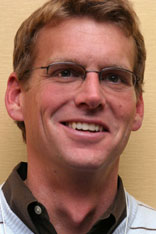
|
||||||||
| Faith Leaders Call for Increase in U.S. ‘Living Wage' | |||||||
|
Faith leaders across the United States have joined a national effort to increase the federal minimum wage to $10 by 2010. The United Methodist Board of Church and Society is among a group representing 11 denominations and national faith organizations signing a letter of support to end "poverty wages" and lift the economy by raising the minimum wage. The letter from Let Justice Roll calls on the 111th Congress "to raise the minimum wage and join us in bringing needed economic security to our families, our communities and our country." According to the coalition, nearly 400 faith leaders from across the country are supporting the $10 in 2010 campaign. The increase in unemployment as well as a rise in the numbers of employed men and women seeking assistance from food banks and homeless shelters compelled faith leaders to support the coalition's campaign for living wages. Throughout the weekend honoring the Rev. Martin Luther King, Jr., Let Justice Roll is conducting and participating in Living Wage events—community gatherings and worship services—to support state and local campaigns. "It is important that work is valued, rather than seeing labor as simply another cost to be contained," said John Hill, a staff member of the Board of Church and Society. "The (Let Justice Roll) movement highlights the need to develop an economy where prosperity is shared, not hoarded by the few, and where hard work enables individuals and families to live lives of dignity, not lives trapped in cycles of poverty." General Conference action The social action agency signed the letter because of the 2008 General Conference's adoption and revision of its resolution on Rights of Workers. The resolution states that The United Methodist Church supports efforts in Congress to raise the minimum wage to a living wage. "When the last minimum wage was adopted, we specifically stated our support was for that measure as a step in the right direction. … This would be another step towards our historic vision of a living wage in every industry," Hill said. The economy would be strengthened if the minimum wage were increased, he said. Policymakers are focused on "stimulating" the economy, to get more money in the hands of ‘consumers' who will spend it, he said. "If wages increase, we know that would put real money in the hands of those who need it the most and who would spend it quickly on necessities in their local communities," he pointed out. When the federal minimum wage increased to $6.55 an hour last July, it still left workers with less buying power than they had in 1997, which was the start of the longest period without a raise since the minimum wage was enacted in1938, according to the Rev. Steve Copley, chairman of Let Justice Roll. "Our economy wouldn't be in such a mess if wages had not fallen so far behind the cost of living and income inequality had not grown to levels last seen on the eve of the Great Depression," said Holly Sklar, senior policy adviser for Let Justice Roll. Hill believes if the prosperity generated in this country had been more evenly shared, the undergirding of the economy would have been stronger and the pain currently felt by those on the "economic margins" would have been far less severe. "It remains unconscionable that we have full-time workers earning less than poverty wages – and incurring debt or relying on government assistance simply to secure life's necessities." Inequality grows King was killed in Memphis in 1968 while advocating for salary increases for sanitation workers. Let Justice Roll says that it would take $10 to match the purchasing power of the 1968 minimum wage. The letter signed by Church and Society and other faith groups says it "immoral" that the minimum wage "is worth less now than it was the year Rev. Dr. Martin Luther King Jr. was killed." The coalition said that the eroded value of the minimum wage has reinforced growing inequality, which has given the richest 1 percent of Americans a greater share of the nation's income than any year since 1928. "This has undermined our communities, our economy and our democracy." According to Hill, King's vision "was one of shared prosperity where all God's children had a place at the table and were nourished by God's abundance. Placing those on the economic margins squarely in the center of our economic policies is essential to realizing this vision." He said that for too long, low-wage workers have been denied access to the table, "a table they probably built, set and served," but have been forced to stand on the sidelines while others benefited from their work. "This movement is one of shared prosperity where every worker can live a life of dignity and enjoy God's abundance." The letter calls an adequate minimum wage a "bedrock moral value" for the nation. "Where the Congress sets the minimum wage reflects whether our society truly believes that workers are human beings with inherent dignity, inalienable rights and basic needs such as food, shelter and healthcare." |
|
||||||
 |
Last
Updated
January 17, 2009




